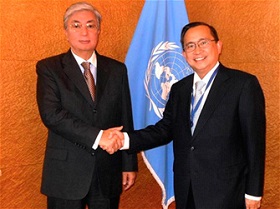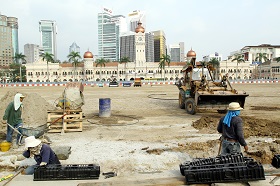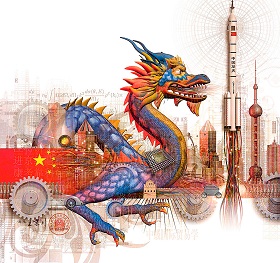Opening remarks of the Hon. Evan P. Garcia, Undersecretary for Policy, Department of Foreign Affairs, Republic of the Philippines, at the roundtable discussion on security developments in the Asia Pacific Region: Philippine and Russian perspectives.
Permit me at the outset to thank the Russian International Affairs Council for collaborating with the Philippine Embassy in Moscow in arranging this roundtable today. And thank you for your interest in the Philippines and in our region in general.
This roundtable discussion between Philippine foreign service officials on the one hand and Russian think tanks and experts on the other is a mechanism we would like to promote so that we can reach out to each other on multiple fora, in order to get a pulse for how our people really think and feel.
The present political security order has become almost unrecognizable compared to what it was when our countries established formal diplomatic relations some four decades ago. The changes, as mirrored in the Asia Pacific, have been so substantial that understanding them requires both actors and observers to constantly share views in order to better appreciate each other’s perspectives.
Within this context one of the major changes, of course, has been the emergence of East Asia, Southeast Asia and particularly China as major poles of the global economy and global geopolitical setup. I would like to remind you that China’s ascent has coincided with ASEAN’s own emergence as an indispensible actor in regional security discussions. From a loose grouping of 5 countries in 1967 with a very limited purview, ASEAN has evolved into a respected and established association which has, in fact, become the point of centrality for almost all the regional institutions and mechanisms that promote dialogue and understanding not just on development cooperation but also on security and defense.
The Philippines in particular has been performing quite remarkably on the economic front. Our GDP grew by 7.2% in 2013, second only to the People’s Republic of China, despite the terrible typhoon that we suffered in the central part of the country. The Philippines has had investment upgrades for the first time in its history, from three leading investment rating agencies - Fitch, Standard and Poor’s and Moody’s. Earlier this month, Standard and Poor’s made a further upgrade of our country’s investment rating. All these agencies have cited the country’s strong fiscal condition, resilient economy, moderate inflation and potential for more growth, as the reasons for their upgrades.
But these macroeconomic fundamentals are only good for a quarter or a year or five years. But you should really look at the long-term perspective. And the key long-term trend in the Philippines is that within the next few years we will be hitting what is called a “demographic sweet spot”, when the majority of the country under the middle age will all be in the work force. This is a tremendous asset which our neighbors and our partners should help us take advantage of for mutual benefit. So the Philippines has a lot of long-term potential, on top of the short term macroeconomic fundamentals I mentioned.
The Philippines was able to achieve this remarkable economic growth despite many uncertainties in the region and in the world, thanks in large part to the new paradigm of governance brought in by our current President. His focus on anti-corruption measures, transparency, accountability, and inclusiveness has set us more firmly on the path of sustainable growth beyond the bust-and-boom cycles of the past. This growth is much more sustained and will be sustained in the future.
Together with the rise of China and the general economic vibrancy of our region, we have also seen our neighboring countries getting more integrated with us - Japan, Korea, India … and now Russia is also interested in a closer association with our region. So we have the capacity to be a partner of all the interested economies in the world and all of us can share in this dynamic growth momentum. The economic performance of the region as a whole has been incredible. In fact, it has been so good I would even call it the “second economic miracle”. The growth of exports, the integration of economies, the rise of the middle class, all of these for me constitute a second economic miracle in the teeth of the Asian financial crisis and the European economic slowdown and the meltdown of North American banks. We have steadily moved forward.
I, for one, as a Filipino official and a Filipino citizen, welcome China’s contribution to this growth and its peaceful rise. There is no doubt that China has also been a positive factor in this economic development.
Unfortunately, our rosy view of the future is tinged by growing concern on certain regional security issues that remind us that we do not just face the challenges of the new century, but that we must grapple with some very old-fashioned, I would say almost 19th century contests between nation states. This is not the vision we want. This is not the future we want. This is the present that we have to grapple with, with our friends in the region, centered on the South China Sea mainly but also up in the East China Sea between our other friends and neighbors, and so on and so forth.
Our intention has always been, because we were not able to make any sensible progress in our bilateral discussions with them, to bring our dispute with China to international arbitration under UNCLOS. We believe that by doing so, we engage in a peaceful and rules-based resolution of the dispute to enrich the field of International Law with declarations on the extent of claims states may be entitled to under international law. We had pursued bilateral dialogue, as I said, but they have not yielded what we had hoped to get.
So this is the general situation in the area in which we would like to acknowledge and express appreciation for Russia’s own growing interest and participation.
In 2013, we note that Russia’s total trade with the six biggest economies of ASEAN amounted to a little over 17 billion dollars. Mutual investment between Russia and ASEAN will further boost economic activity which, in turn, will serve as a driving force for increased overall engagement. We note that Russia is making headway in this regard as evidenced by the development of a nuclear power plant in Vietnam. Russia can transpose its positive relations with Vietnam into greater cooperation with the Philippines and other ASEAN member states. We note, of course, that Russia, being one of the top 10 economies in the world, has a fundamental stake in this region not for abstract reasons, but from the point of view of the fact that Russia is a Pacific power and an Asian power, and has been so for so many years. And that role should continue to be a positive one as we move forward.
We also, in particular, note the special interest that Russia is making in the development of its Far East region, which I think is a lot easier done if that part is integrated with our part of Asia. It will be much faster than if we decide to rely only on inputs and linkages all the way up in the West.
It is in this context that I would like to thank the Russian International Affairs Council for giving us this opportunity for an exchange. We hope to hear a lot from our Russian friends. We will be very attentive to what you have to say.
But not everything is dark, as I said. If everybody played by accepted rules and was moderate in their claims and counterclaims, it is always possible with enough goodwill, cooperation, confidence and trust to arrive at necessary and mutually-satisfactory solutions. Just before coming here I was in Jakarta where we concluded discussions on the delimitation agreements for our EEZs. It took us twenty (20) years to get there, twenty years. But it goes to show you that it is possible to make amicable settlements between countries provided that the rule of law are respected, and claims and counterclaims are not immoderate. Of course, I must also add, there was this odd comment that came out when we went to court, that it is not the Asian way to go to court. But then we have Indonesia and Malaysia, and we have Vietnam, and we have Thailand and Cambodia, we have Singapore and Malaysia — they all went to court to settle sensitive issues. So there’s nothing un-Asian about going to court.
With that I thank you all. I kept my remarks brief and I hope interesting enough to evoke a continued discussion.






